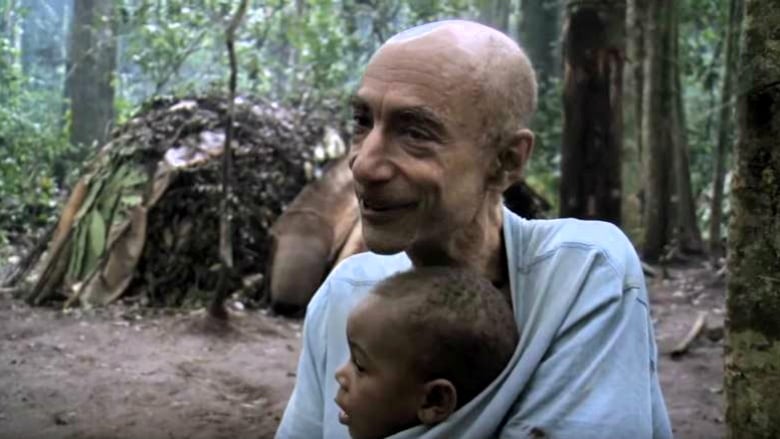Jim Jarmusch remembers Louis Sarno, who spent his life preserving a Pygmy clan's music and culture

Writer Louis Sarno — who loved the music of Central African Republic's Bayaka Pygmies so much that he joined their tribe and lived with them for 30 years — died last week in New Jersey. He was 62.
Sarno first heard Bayaka music on the radio in Amsterdam in the early 1980s and was so captivated, he travelled to the rainforest village of Yandoumbe to learn more.
He spent the next 30 years of his life there, documenting and recording Bayaka music and culture, and writing about his experiences. He even became a member of the tribe, marrying two local women and adopting two sons, according to the New York Times.
Medical complications from hepatitis B, malaria, leprosy and cirrhosis brought Sarno back to his childhood home of New Jersey last fall, and he died of liver complication on April 1.
His lifelong friend, U.S. filmmaker Jim Jarmusch, spoke with As It Happens host Carol Off about how Sarno lived a full life, free of regrets. Here is part of their conversation.
Carol Off: Can you recall the last time that you spoke with Louis Sarno?
JJ: Yes, I saw him a few weeks ago. We sat and spoke for several hours together.
CO: And how did you find him?
JJ: It was quite shocking this time. Each year, he would return from Africa to the States for various reasons, the last years, often, some of them medical. And he was very, very fragile, and very kind of weakened.
CO: There's a quote from him that's so striking. He said: "I was drawn to the heart of Africa by a song. I boarded a plane that would take me into the equatorial heart of a continent where I did not know a soul on a quest for a music that might have been nothing more than a state of my imagination." What kind of a person does that?
JJ: Well, wow. He's very difficult to describe. He had a remarkable mind and imagination. He was really, really moved by music.
He was very, very interested in science and nature. He was one of the most gentle people that I've ever met.
We were in our late teens or early twenties when we first became friends, and he's one of the first people that I knew who was so careful of any living thing, for example, removing an insect to take it outside.
I remember I used to visit him when he was in graduate school at Rutgers for a while, and he lived in kind of a very bad building and his neighbours were some Appalachian people — some kids, I never saw the parents.
Every time I visited him, these little kinda hillbilly kids would always be in his apartment and he'd be telling them these incredible stories about seafaring pirates and sea creatures and things in the jungle. They were just riveted, and he had this way, really, with all people.

And he also had the most incredible sense of humour. I don't know if you have one person in your life who is like your laughing friend, a person you laughed the most with? For me, this was Louis. We used to laugh together so hard that we would get these incredible pains in the back of our heads.
CO: What's so fascinating about Louis Sarno is that when he went to find out about the Bayaka Pygmies ... he lived with them, he became part of their society. He had to penetrate and be on the other side of the glass. Did that come as a surprise to you, that he needed to do that?
JJ: No, it seemed keeping with his soul. He really liked the purity of their culture, even though he saw it becoming gradually devastated in many ways.
And the music is incredibly particular and exquisite.
I remember once, the amazing Japanese composer Toru Takemitsu, who I knew a little bit, he was visiting my loft in New York and I played him these recordings of the Bayaka that Louis had made, and he sat on the floor for about an hour with his eyes closed just absorbing this music. And afterward he said, 'This is the most elegant music I have ever heard.'
And now, thanks to Louis, the Pitt Rivers Museum in Oxford has all his archives of his recordings of this music.
CO: Can you tell us about his relationships?
JJ: He became very important to them, and so there were always a lot of children around him.
He never had anything, but they obviously really loved him, and I heard that this last time when he left the village, they all followed him for quite awhile. And that was the first time they ever did that. And I think that they were very concerned that they might not see him again.
CO: Did he ever regret the path that he chose?
JJ: No, never! [laughs]. And even when I last was with him and talking with him, you know, he said: 'I just want to get healthy enough to get back there.'
One thing I know about Louis is he definitely lived his life as he chose. And I have so much admiration for him, for how he lived his life, and I'm sure he regrets nothing.
This transcript has been edited for length and clarity. To hear more, listen to our full conversation with Jim Jarmusch.